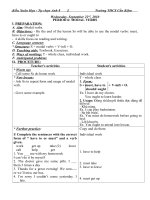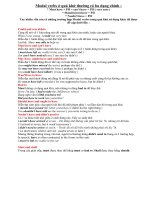English Modal Verbs
Bạn đang xem bản rút gọn của tài liệu. Xem và tải ngay bản đầy đủ của tài liệu tại đây (171.53 KB, 19 trang )
English Modal Verbs
(Nhấn phím CTRL + Click chuột để đến nội dung)
Modal forms
Can
Could
Had Better
Have to
Have Got to
May
Might
Must
Ought to
Shall
Should
Will
Would
Modal Forms
Modal verbs can be used in a variety of different forms. Study the examples below.
Modal Simple
I could swim at the beach.
Modal Continuous
I could be swimming at the beach right now.
Modal Perfect
I could have swum at the beach yesterday.
Modal Perfect Continuous
I could have been swimming at the beach
instead of working in the office.
Passive Modal Simple
The room should be cleaned once a day.
Passive Modal Continuous
The room should be being cleaned now.
Passive Modal Perfect
The room should have been cleaned yesterday.
Passive Modal Perfect Continuous
The room should have been being cleaned but
nobody was there. (Rare form)
(quay trở lại đầu trang)
Can
"Can" is one of the most commonly used modal verbs in English. It can be used to express
ability or opportunity, to request or offer permission, and to show possibility or impossibility.
Examples:
• I can ride a horse. ability
• We can stay with my brother when we are in Paris. opportunity
• She cannot stay out after 10 PM. permission
• Can you hand me the stapler? request
• Any child can grow up to be president. possibility
Using "Can" in Present, Past, and Future
Most modal verbs behave quite irregularly in the past and the future. Study the chart below to
learn how "can" behaves in different contexts.
Modal Use
Positive Forms
1. = Present 2. = Past 3.
= Future
Negative Forms
1. = Present 2. = Past 3.
= Future
You can also use:
can
general ability
1. I can speak Chinese.
2. SHIFT TO "COULD"
I could speak Chinese
when I was a kid.
1. I can't speak Swahili.
2. SHIFT TO "COULD"
I couldn't speak Swahili.
be able to
3. SHIFT TO "BE ABLE
TO"
I will be able to speak
Chinese by the time I
finish my course.
3. SHIFT TO "BE ABLE
TO"
I won't be able to speak
Swahili.
can
ability during a
specific event
1. With a burst of
adrenaline, people can
pick up cars.
2. SHIFT TO "BE ABLE
TO"
With a sudden burst of
adrenaline, he was able to
lift the car off the child's
leg.
3. SHIFT TO "BE ABLE
TO"
With a sudden burst of
adrenaline, he will be able
to lift the car.
1. Even with a burst of
adrenaline, people can't
pick up something that
heavy.
2. SHIFT TO "BE ABLE
TO"
Even the weight lifter,
couldn't lift the car off the
child's leg.
3. SHIFT TO "BE ABLE
TO"
Even three men working
together won't be able to
lift the car.
be able to
can
opportunity
1. I have some free time. I
can help her now.
2. SHIFT TO "BE ABLE
TO"
I had some free time
yesterday. I was able to
help her at that time.
3. I'll have some free time
tomorrow. I can help her
then.
1. I don't have any time. I
can't help her now.
2. SHIFT TO "BE ABLE
TO"
I didn't have time
yesterday. I wasn't able to
help her at that time.
3. I won't have any time
later. I can't help her then.
be able to
can
permission
1. I can drive Susan's car
when she is out of town.
2. SHIFT TO "BE
ALLOWED TO "
I was allowed to drive
Susan's car while she was
out of town last week.
3. I can drive Susan's car
while she is out of town
next week.
1. I can't drive Susan's car
when she is out of town.
2. SHIFT TO "BE
ALLOWED TO "
I wasn't allowed to drive
Susan's car while she was
out of town last week.
3. I can't drive Susan's car
while she is out of town
next week.
may
can
request
Can I have a glass of
water?
Can you give me a lift to
school?
Requests usually refer to
the near future.
Can't I have a glass of
water?
Can't you give me a lift to
school?
Requests usually refer to
the near future.
could, may
can
possibility,
impossibility
Anyone can become rich
and famous if they know
the right people.
Learning a language can
be a real challenge.
This use is usually a
generalization or a
supposition.
It can't cost more than a
dollar or two.
You can't be 45! I thought
you were about 18 years
old.
This use is usually a
generalization or a
supposition.
could
(quay trở lại đầu trang)
Could
"Could" is used to express possibility or past ability as well as to make suggestions and requests.
"Could" is also commonly used in conditional sentences as the conditional form of "can."
Examples:
• Extreme rain could cause the river to flood the city. possibility
• Nancy could ski like a pro by the age of 11. past ability
• You could see a movie or go out to dinner. suggestion
• Could I use your computer to email my boss? request
• We could go on the trip if I didn't have to work this weekend. conditional
Using "Could" in Present, Past, and Future
Most modal verbs behave quite irregularly in the past and the future. Study the chart below to
learn how "could" behaves in different contexts.
Modal Use
Positive Forms
1. = Present 2. = Past 3. =
Future
Negative Forms
1. = Present 2. = Past 3. =
Future
You can
also use:
could 1. John could be the one who 1. Mary couldn't be the one who might,
possibility
stole the money.
2. John could have been the one
who stole the money.
3. John could go to jail for
stealing the money.
stole the money.
2. Mary couldn't have been the
one who stole the money.
3. Mary couldn't possibly go to
jail for the crime.
may
could
conditional
of can
1. If I had more time, I could
travel around the world.
2. If I had had more time, I
could have traveled around the
world.
3. If I had more time this winter,
I could travel around the world.
1. Even if I had more time, I
couldn't travel around the world.
2. Even if I had had more time, I
couldn't have traveled around the
world.
3. Even if I had more time this
winter, I couldn't travel around
the world.
could
suggestion
1. NO PRESENT FORM
2. You could have spent your
vacation in Hawaii.
3. You could spend your
vacation in Hawaii.
NO NEGATIVE FORMS
could
past ability
I could run ten miles in my
twenties.
I could speak Chinese when I
was a kid.
"Could" cannot be used in
positive sentences in which you
describe a momentary or one-
time ability.
Yesterday, I could lift the couch
by myself. Not Correct
I couldn't run more than a mile in
my twenties.
I couldn't speak Swahili.
"Could" can be used in negative
sentences in which you describe
a momentary or one-time ability.
Yesterday, I couldn't lift the
couch by myself. Correct
be able to
could
polite
request
Could I have something to
drink?
Could I borrow your stapler?
Requests usually refer to the
near future.
Couldn't he come with us?
Couldn't you help me with this
for just a second?
Requests usually refer to the
near future.
can,
may,
might
REMEMBER: "Could not" vs. "Might not"
"Could not" suggests that it is impossible for something to happen. "Might not" suggests you do
not know if something happens.
Examples:
• Jack might not have the key. Maybe he does not have the key.
• Jack could not have the key. It is impossible that he has the key.
(quay trở lại đầu trang)
Had Better
"Had better" is most commonly used to make recommendations. It can also be used to express
desperate hope as well as warn people.
Examples:
• You had better take your umbrella with you today. recommendation
• That bus had better get here soon! desperate hope
• You had better watch the way you talk to me in the future! warning
Using "Had Better" in Present, Past, and Future
Most modal verbs behave quite irregularly in the past and the future. Study the chart below to
learn how "had better" behaves in different contexts.
Use
Positive Forms
1. = Present 2. = Past 3. =
Future
Negative Forms
1. = Present 2. = Past 3. =
Future
You can
also use:
had better
recommendation
1. SHIFT TO "SHOULD"
OR "OUGHT TO"
People should unplug toasters
before they clean them.
2. SHIFT TO "SHOULD
HAVE" OR "OUGHT TO
HAVE"
You should have unplugged
the toaster before you tried to
clean it.
3. You had better unplug the
toaster before you try to clean
1. SHIFT TO "SHOULD"
OR "OUGHT TO"
People shouldn't clean
toasters without unplugging
them first.
2. SHIFT TO "SHOULD
HAVE" OR "OUGHT TO
HAVE"
You shouldn't have cleaned
the toaster without
unplugging it first.
3. You had better not clean
should,
ought to
it.
the toaster until you unplug
it.
had better
desperate hope,
warning
The movie had better end
soon.
They had better be here
before we start dinner.
Desperate hopes and
warnings usually refer to the
near future.
They had better not be late.
They had better not forget
Tom's birthday gift.
Desperate hopes and
warnings usually refer to the
near future.
"Had better" is often simply pronounced as "better" in spoken English.
(quay trở lại đầu trang)
Have To
"Have to" is used to express certainty, necessity, and obligation.
Examples:
• This answer has to be correct. certainty
• The soup has to be stirred continuously to prevent burning. necessity
• They have to leave early. obligation
Using "Have to" in Present, Past, and Future
"Have to" behaves quite irregularly in the past and the future. Study the chart below to learn how
"have to" behaves in different contexts.
Use
Positive Forms
1. = Present 2. = Past 3. =
Future
Negative Forms
1. = Present 2. = Past 3. = Future
You
can
also
use:
have to
certainty
1. That has to be Jerry. They
said he was tall with bright red
hair.
2. That has to have been the
right restaurant. There were no
other restaurants on the street.
1. SHIFT TO "MUST"
That must not be Jerry. They said he
has blond hair, not red hair.
2. SHIFT TO "MUST"
That must not have been the right
restaurant. I guess there was another
must,
have
got to









